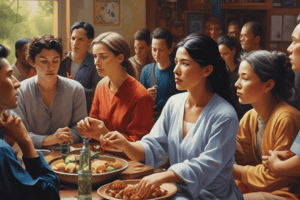Podcast
Questions and Answers
What is culture shock?
What is culture shock?
Culture shock occurs when a person finds themselves in a new cultural encounter that is unfamiliar or unusual, causing distress and disorientation.
Which of the following is NOT a stage of culture shock?
Which of the following is NOT a stage of culture shock?
- Assimilation Stage
- Crisis Stage
- Developing Stage (correct)
- Honeymoon Stage
What happens during the Crisis Stage of culture shock?
What happens during the Crisis Stage of culture shock?
During the Crisis Stage, individuals experience confusion, anxiety, homesickness, and loneliness.
What does culture lag refer to?
What does culture lag refer to?
The key trait of being _______ refers to the respect for elders in Filipino culture.
The key trait of being _______ refers to the respect for elders in Filipino culture.
Which of the following is considered a positive trait in Filipino culture?
Which of the following is considered a positive trait in Filipino culture?
Man is a product of both culture and nature.
Man is a product of both culture and nature.
What is the process of evolution?
What is the process of evolution?
According to Charles Darwin, natural selection leads to _____.
According to Charles Darwin, natural selection leads to _____.
What is a mutation?
What is a mutation?
Flashcards are hidden until you start studying
Study Notes
Culture Shock
- Occurs when an individual encounters a new cultural environment, leading to distress and disorientation.
Four Stages of Culture Shock
- Honeymoon Stage: Individual feels excitement and amazement at new experiences.
- Crisis Stage: Overwhelming feelings of confusion, anxiety, homesickness, and loneliness arise.
- Adjustments: Gradual acclimatization to the new culture; routines start to form.
- Assimilation Stage: Individual feels settled and comfortable, fully embracing the cultural setting.
Key Concepts
- Culture Lag: Delay in adapting to new conditions or innovations within a culture.
- Key Differences: Variations that exist at different times within a cultural context.
- Cultural Gap: Differences in practices and beliefs among various groups.
Filipino Values
- Defined citizens under the 1987 Philippines Constitution include those born to Filipino parents and naturalized individuals.
- Cultural Impact: Culture and history shape Filipino learning, behavior, and values, passed down through generations.
- Collectivist Culture: Strong communal ties and interdependence among Filipinos.
Positive Traits of Filipinos
- Hospitality, respect for elders, close family ties, sense of humor, bayanihan (community spirit), self-sacrifice, creativity, and industriousness.
Negative Traits of Filipinos
- Extreme personalism (padrino system), family-centeredness, mañana habit (procrastination), ningas cogon (initial enthusiasm), kanya-kanya syndrome (selfishness), crab mentality, colonial mentality, and high pride associated with "Filipino Time" and "Bahala na" attitude.
The Human Race
- Cultural Being: Man shaped by culture, perceptions, and experiences.
- Social Being: Naturally gregarious, seeking relationships with others.
- Rational Being: Uses logic and critical thinking, guided by reasoning rather than instinct.
- Spiritual Being: Combination of body and soul, seeking material and spiritual fulfillment.
- Moral Being: Possesses a sense of morality, making choices and accepting responsibility.
- Natural Being: Influenced by natural law, with characteristics and limitations dictated by nature.
Theory of Evolution
- Jean-Baptiste Lamarck: Proposed theory of use and disuse exemplified by the neck elongation of giraffes.
- Charles Darwin: Introduced natural selection as a mechanism where species evolve through genetic changes.
- Evolution: The gradual biological change in a population over generations, influenced by genetic variations within the gene pool.
Mechanism in Evolution
- Mutation: Changes in the DNA sequence that introduce variations in species, essential for evolution.
Recent Items in Board Exams
- Focus on understanding contemporary and historical implications of cultural processes and theories related to evolution and anthropology.
Studying That Suits You
Use AI to generate personalized quizzes and flashcards to suit your learning preferences.




